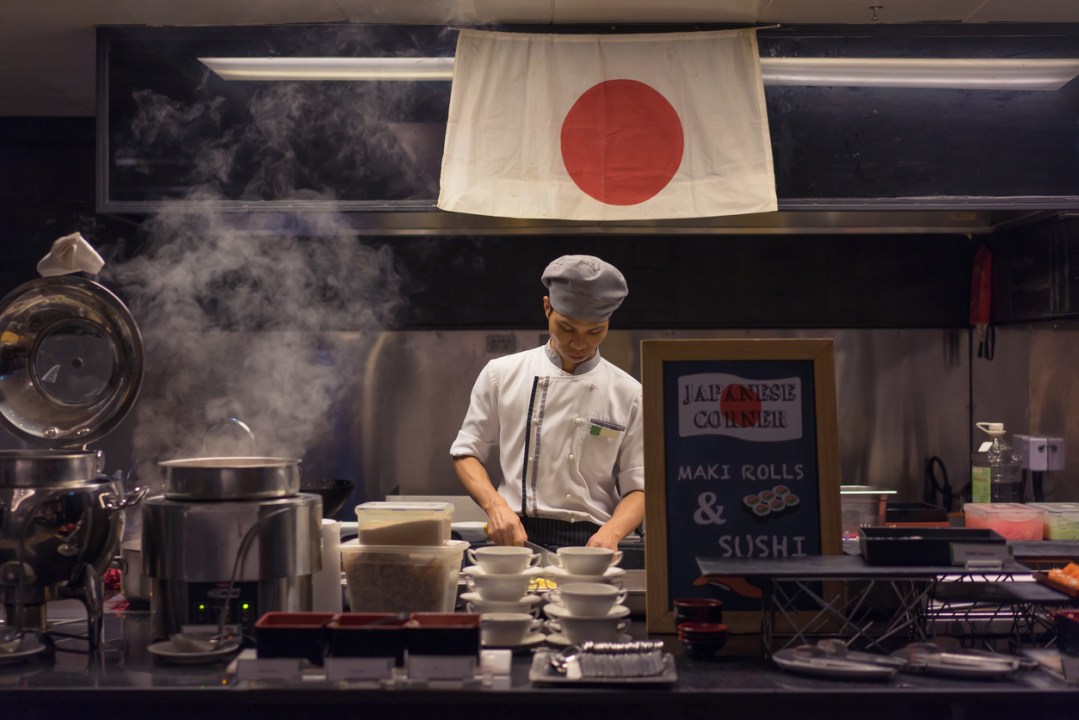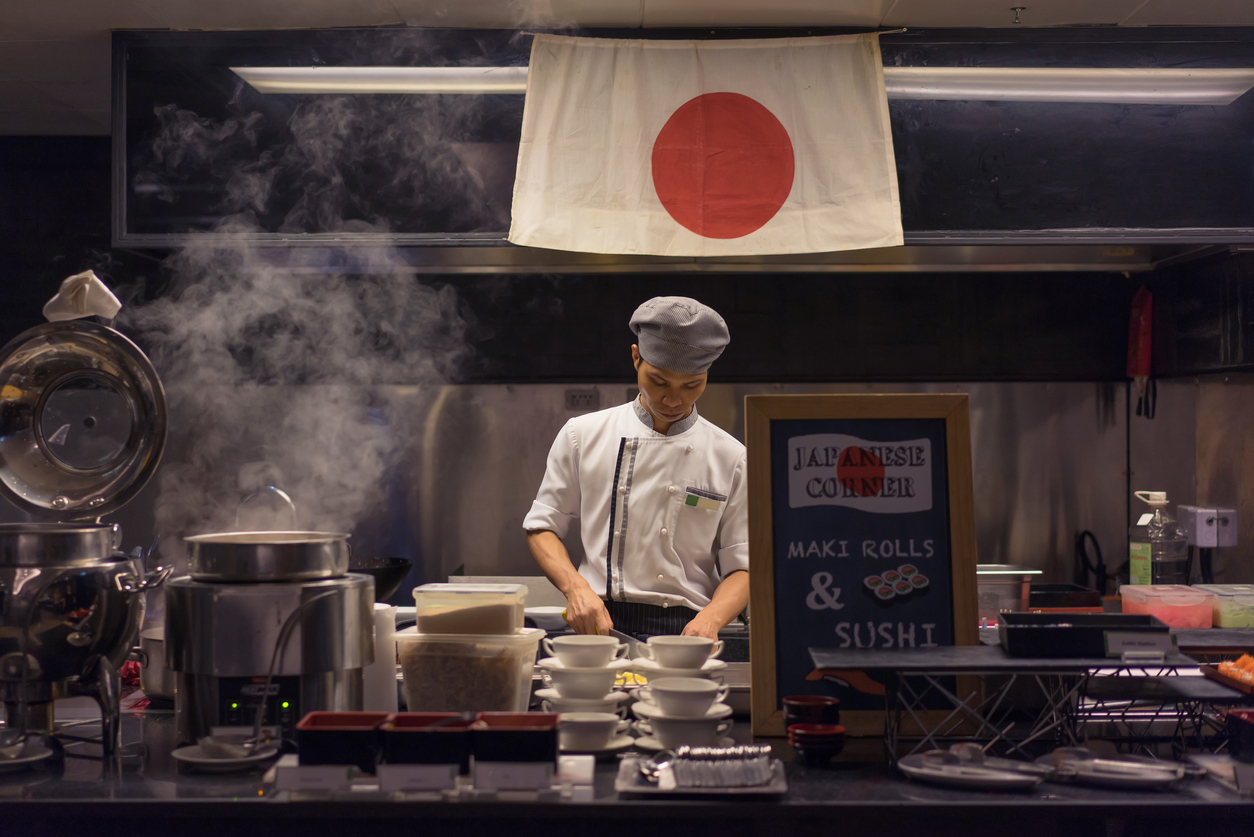One thing you can be sure of on a visit to Japan is that the service will be at the very least good, and quite often superb. The chances of being short-changed, snubbed, or slighted are virtually zero and truly bad service is so rare I almost, after 24 years in Tokyo, crave it now and again to break the monotony. ‘The customer is God’ as the Japanese say, and sometimes this exhortation to staff feels like only a slight exaggeration.
I once witnessed a sad scene where an old lady tried to engage the cashier in a supermarket in casual conversation
At its best, Japanese service can be glorious to behold. I once saw a customer drop money from her purse in the crowded food hall of Isetan (Japan’s version of Harrods). At the first tinkle of the coins, staff leapt into action. One woman charged over and virtually prostrated herself on the floor to gather up the loose change, in the manner of a soldier throwing himself on a grenade to smother the explosion. She then stood to attention, and with an almost horizontal bow, stretched out both hands to return the coins to their owner while intoning, with immense dignity ‘o-kyaku-sama!’ (‘honourable customer!’).
In the same store, I once exited a stall in the gents (immaculate, of course) and found myself face to face with the cleaning lady, resplendent in her pristine uniform and armed with a small arsenal of cleaning implements. She had been waiting, patiently, for me. Our eyes met and she bowed deeply, then with great reverence said ‘arigatou gozaimashita’ – which literally translates as ‘thank you for what you have just done’.
This attitude reflects the great pride the Japanese take in their work, even if that work is menial and lowly paid. There is an impressive lack of ‘attitude’ in service staff, which perhaps derives from the Confucian idea of everyone having their place in society and contributing to cosmic harmony. I was once given a tour of a factory by someone who obviously occupied the lowest rung in the organisation. ‘I’ve been here for 25 years’, he told me enthusiastically, ‘doing exactly the same job!’ and his face radiated pride in what he obviously regarded as a great accomplishment.
There is a cold business imperative at work too, though. In 2017 American Express conducted research which found that in Japan 56 per cent of customers would take their business elsewhere after just one bad service experience compared to around 20 to 30 per cent in the eight other countries surveyed. The Japanese don’t complain, they decamp, so you better get the service right first time or you won’t see them again.
But having the red carpet forever unfurled before you can be wearing. One criticism of Japan’s service culture is its inflexibility. For example, call your bank or credit card company and the operator might well insist on speaking to you only in ‘keigo’, the fiendishly complicated honorific Japanese that foreigners are not expected to use. A friend once begged the operator to switch to informal language instead as he was struggling to follow. He was told this couldn’t be done as it would be impolite.
The excesses of ‘manual service’ as the Japanese call it, are sometimes blamed on the influx of American fast-food restaurants in the 1970s. While in the US the repetition of set phrases (‘Have a nice day!’) was simply a method of maximizing efficiency, in Japan it chimed with the ancient tea ceremony concept of ‘kata’ (the perfect way of doing things) and the philosophical notion of ‘Ichi-go ichi-e’ (you might only meet someone once so the moment should be treasured). Thus, the scripted, choreographed service protocols were gold-plated and the practice spread into the wider hospitality environment.
The obsession with streamlining interactions and processes led to a trend towards eliminating all non-standard options. Go off script and make an unusual request and you can find yourself in trouble. I once asked for a Coke without ice in a karaoke bar at the height of summer. This was met with a look of bewilderment and dismay. The girl serving me disappeared for about 20 minutes before coming back (having presumably consulted with her boss, or head office) to tell me that coke without ice ‘wasn’t possible’.
At its worst, the constant reprise of set polite expressions, often thousands of times a day, in the proscribed squeaky falsetto sing-song cadence can make improvisation almost impossible. I once witnessed a sad scene where an old lady tried to engage the cashier in a supermarket in casual conversation. Struck dumb, the young girl couldn’t respond and looked around despairingly (for her supervisor?); the manual hadn’t been taught how to deal with this situation and she couldn’t cope. ‘Assistance required at till 9 – customer wants to chat.’
Still, I really shouldn’t complain. The charming moments, of which there have been many, are to be treasured. My favourite occurred not in a shop, hotel, or restaurant, but in a police station. The one time I lost my wallet in Japan it was handed in (unrifled, of course) and was returned to me by the officer with ceremony and reverence and not a hint of reproach. And for reasons I can only wonder at, someone had tied a beautiful pink ribbon around it. With a double bow.







Comments